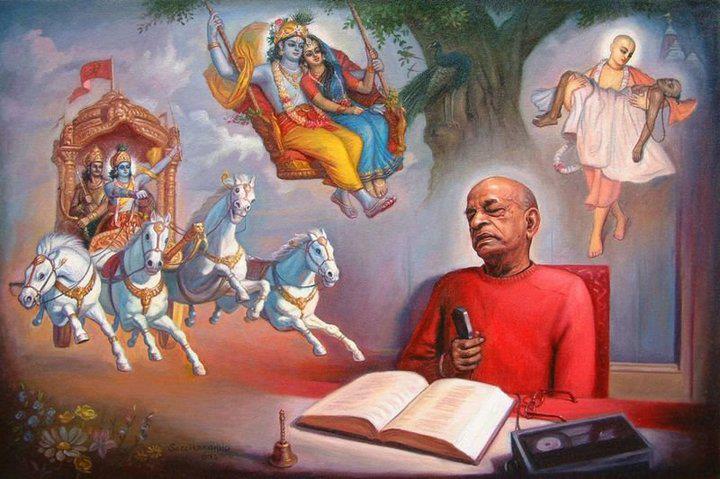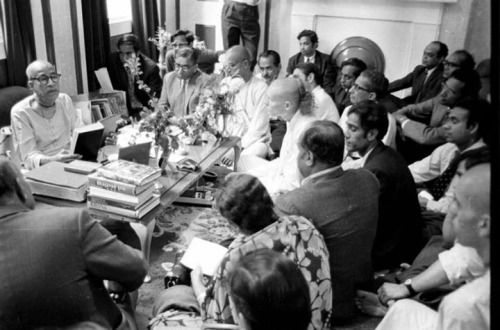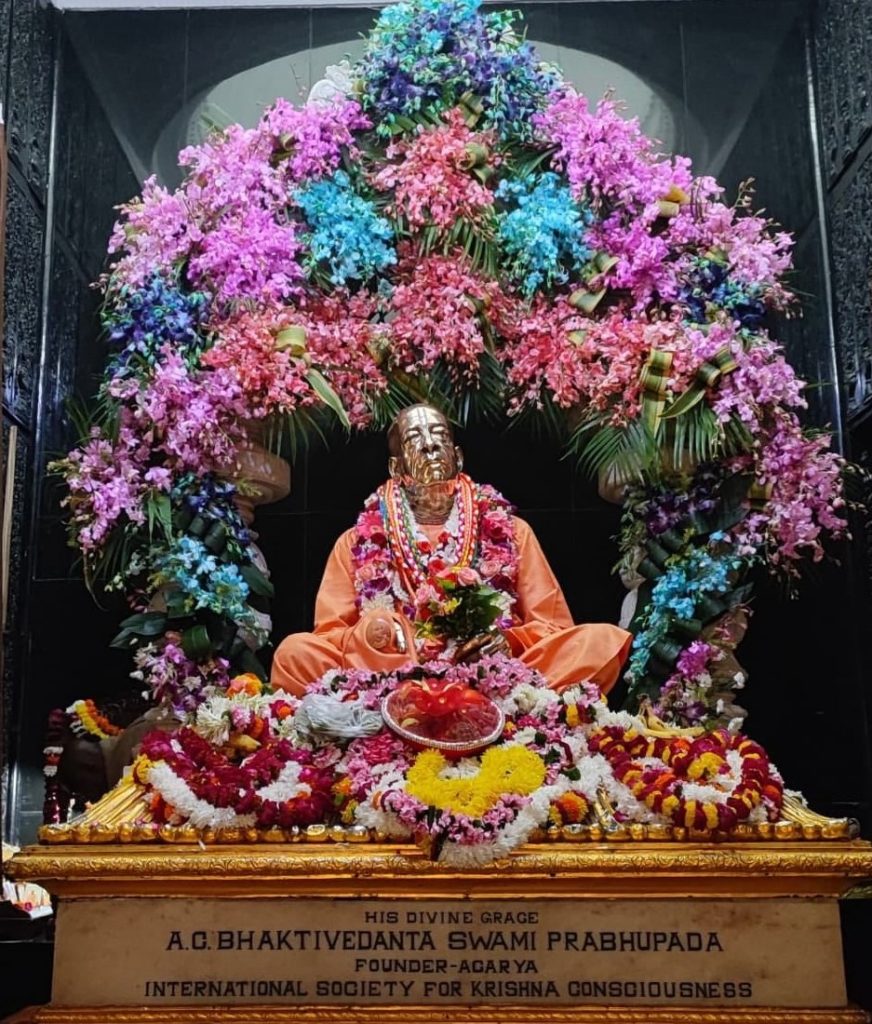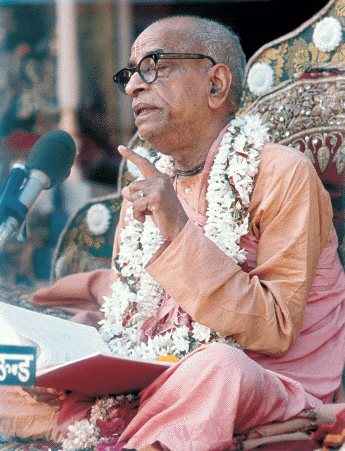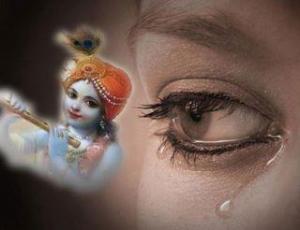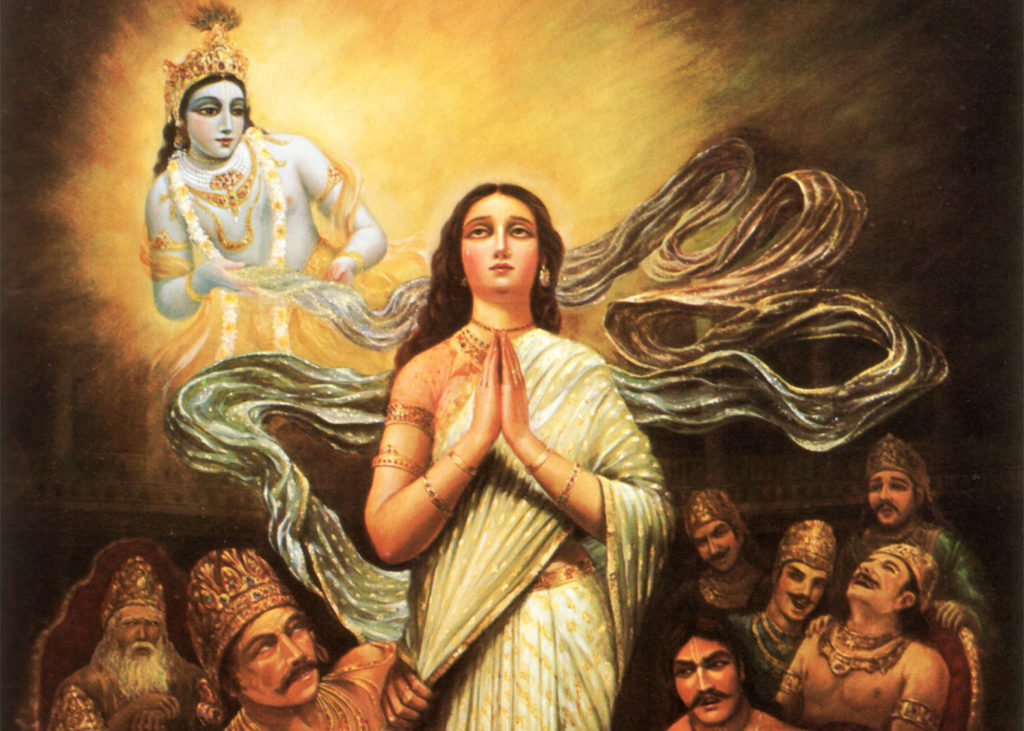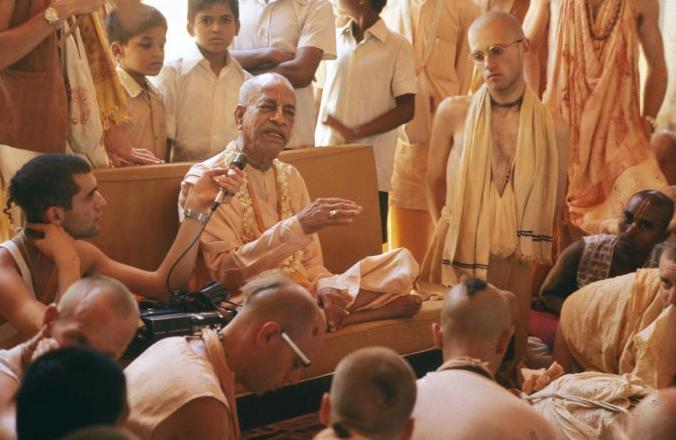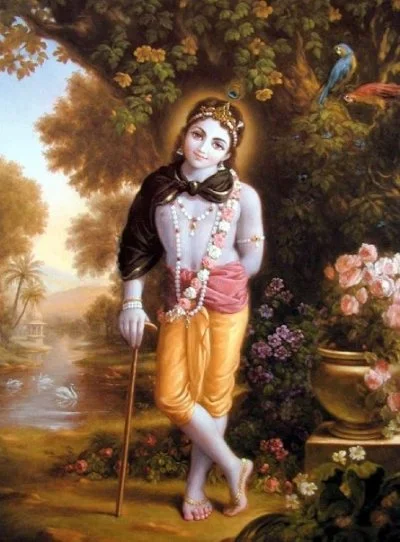
Hare Krishna,
In the last blog we read how there is a Television in our heart. Today we will read how to switch on that television and see God face to face as well in our heart.
Why everyone can not see God face to face?
Lord Śrī Kṛṣṇa’s name, fame, pastimes, etc., cannot be understood by material senses. Only to one who is engaged in pure devotional service under proper guidance is He revealed. In the Brahma-saṁhitā (5.38) it is stated, premāñjana-cchurita-bhakti-vilocanena santaḥ sadaiva hṛdayeṣu vilokayanti: one can see the Supreme Personality of Godhead, Govinda, always within himself and outside himself if one has developed the transcendental loving attitude towards Him. Thus for people in general He is not visible.
(Bg 9.4p)
Demons sometimes declare to a devotee that they cannot accept the existence of God because they cannot see Him. But what the demon does not know is stated by the Lord Himself in Bhagavad-gītā (7.25): nāhaṁ prakāśaḥ sarvasya yogamāyā-samāvṛtaḥ. “I am never manifest to the foolish and unintelligent. For them I am covered by yogamāyā.” The Lord is open to being seen by devotees, but nondevotees cannot see Him.
It’s a mystery!
The impersonalists can imagine or even perceive that the Supreme Brahman is thus all-pervading, and therefore they conclude that there is no possibility of His personal form. Herein lies the mystery of His transcendental knowledge. This mystery is transcendental love of Godhead, and one who is surcharged with such transcendental love of Godhead can without difficulty see the Personality of Godhead in every atom and every movable or immovable object. And at the same time he can see the Personality of Godhead in His own abode, Goloka, enjoying eternal pastimes with His eternal associates, who are also expansions of His transcendental existence. This vision is the real mystery of spiritual knowledge, as stated by the Lord in the beginning (sarahasyaṁ tad-aṅgaṁ ca). This mystery is the most confidential part of the knowledge of the Supreme, and it is impossible for the mental speculators to discover by dint of intellectual gymnastics. The mystery can be revealed through the process recommended by Brahmājī in his Brahma-saṁhitā (5.38) as follows:
premāñjana-cchurita-bhakti-vilocanena
santaḥ sadaiva hṛdayeṣu vilokayanti
yaṁ śyāmasundaram acintya-guṇa-svarūpaṁ
govindam ādi-puruṣaṁ tam ahaṁ bhajāmi
“I worship the original Personality of Godhead, Govinda, whom the pure devotees, their eyes smeared with the ointment of love of Godhead, always observe within their hearts. This Govinda, the original Personality of Godhead, is Śyāmasundara with all transcendental qualities.”
Therefore, although He is present in every atom, the Supreme Personality of Godhead may not be visible to the dry speculators; still the mystery is unfolded before the eyes of the pure devotees because their eyes are anointed with love of Godhead. And this love of Godhead can be attained only by the practice of transcendental loving service of the Lord, and nothing else. The vision of the devotees is not ordinary; it is purified by the process of devotional service. In other words, as the universal elements are both within and without, similarly the Lord’s name, form, quality, pastimes, entourage, etc., as they are described in the revealed scriptures or as performed in the Vaikuṇṭhalokas, far, far beyond the material cosmic manifestation, are factually being televised in the heart of the devotee.
Only by the practice of bhakti-yoga can one achieve the favor of the Supreme Personality of Godhead and see Him face to face (premāñjana-cchurita-bhakti-vilocanena santaḥ sadaiva hṛdayeṣu vilokayanti). One cannot see the Lord by other methods, such as karma, jñāna or yoga. Under the direction of the spiritual master, one must cultivate bhakti-yoga (śravaṇaṁ kīrtanaṁ viṣṇoḥ smaraṇaṁ pāda-sevanam). Then, even within this material world, although the Lord is not visible, a devotee can see Him. This is confirmed in Bhagavad-gītā (bhaktyā mām abhijānāti yāvān yaś cāsmi tattvataḥ and in Śrīmad-Bhāgavatam (bhaktyāham ekayā grāhyaḥ). Thus by devotional service one can achieve the favor of the Supreme Personality of Godhead, although He is not visible or understandable to materialistic persons.
The Lover and the beloved!
Now who can think of Kṛṣṇa always within himself? That is also very easy to understand. If you love somebody, then you can think of him always within yourself. Otherwise it is not possible. If you love somebody, then naturally you’ll think of him always. That is described in the Brahma-saṁhitā: Premāñjana-cchurita-bhakti-vilocanena. One who has developed love of God, or Kṛṣṇa… When I speak of Kṛṣṇa, you should understand “God.” …. Another name of Kṛṣṇa is Śyāmasundara. He is blackish like the cloud, but very beautiful; therefore His name is Śyāmasundara. So in this verse of Brahma-saṁhitā it is said that the santaḥ, saintly person, who has developed love for Śyāmasundara, Kṛṣṇa… Premāñjana-cchurita-bhakti-vilocanena santaḥ sadaiva. Sadaiva means always, constantly. Santaḥ sadaiva hṛdayeṣu. Hṛdayeṣu means within the heart. Actually, when one comes to the point of samādhi in yoga system, he thinks of Viṣṇu form of the Lord within the heart without any stopping.
(Lecture- Gainesville, July 29, 1971)
Just like both lover and beloved. Say one boy, another girl. So they are in love. So both of them think of both of them always. “When we shall meet again, when we shall meet again?” So similarly, man-manā bhava mad-bhaktaḥ. You can become a devotee of Kṛṣṇa, you can think of Kṛṣṇa always, provided you have developed love for Kṛṣṇa. Premāñjana-cchurita-bhakti-vilocanena. By bhakti, you can develop your love for Kṛṣṇa. That is required.
(Lecture, London, August 31, 1973)
You follow Kṛṣṇa’s instruction, and He will be present. He is present; simply we have to purify our eyes and senses to understand Him. That is required. Premāñjana-cchurita-bhakti-vilocanena santaḥ sadaiva hṛdayeṣu. Suppose you have a beloved friend. As soon as you hear telephone call, “Who is it?” “I am this.” “Oh.” You immediately see him. Does it not? Immediately, by the sound. Why? Because you are known to him, you are in love with him. Similarly, in this way, if you develop your dormant love of Kṛṣṇa, you’ll see Kṛṣṇa in every moment.
(Lecture, Bombay, April 1, 1971)
Examples-
Just like Caitanya Mahāprabhu, when he visited Jagannātha temple, He was very anxious to see the Deity, Jagannātha temple. And as soon as He entered the Jagannātha temple, immediately He fainted, “Oh, here is My Lord.” And others are seeing, “What is this foolish man? Here is a wooden form of Jagannātha and this man has fainted.” But that is the difference between this man and you. Unless you develop your devotional attitude, you cannot see God. Bhaktyā mām abhijānāti yāvān yaś cāsmi tattvataḥ
(Lecture, Bombay, October 9, 1973)
A devotee who has developed a genuine love for Kṛṣṇa can always see Him everywhere, whereas a demon, not having a clear understanding of the Supreme Lord, cannot see Him. When Hiraṇyakaśipu was threatening to kill Prahlāda Mahārāja, Prahlāda certainly saw the column standing before him and his father, and he saw that the Lord was present in the pillar to encourage him not to fear his demoniac father’s words. The Lord was present to protect him. Hiraṇyakaśipu marked Prahlāda’s observation and asked him, “Where is your God?” Prahlāda Mahārāja replied, “He is everywhere.” Then Hiraṇyakaśipu asked, “Why is He not in this pillar before me?” Thus in all circumstances the devotee can always see the Supreme Lord, whereas the nondevotee cannot.
In the end..
So everything depends on me. I can see God. Just like I am seeing you face to face, you are seeing me face to face, similarly, you can see Kṛṣṇa face to face. Just like Arjuna saw face to face. Why? Because the relationship was so nice that they were in friendly relation. So seeing of God is not very difficult. Simply we have to acquire that qualification.
(Lecture New York, July 27, 1966)
I hope this helps us feel inspired to aspire to see God face to face.
Your servant,
Giriraj dasa

